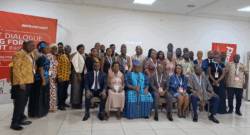By Angela KYEREMATEN-JIMOH
Across Africa and beyond, countries are racing to build competitive digital economies, and Ghana stands at the cusp of this technological revolution.
Countries that once lagged are now leapfrogging into the future with smart infrastructure such as e-commerce ecosystems, digital identity systems and AI-driven public services; unlocking real opportunities for growth, creating jobs, improving how we access essential services and, ultimately, making everyday life better for people across the continent.
Africa’s Internet economy has the potential to contribute approximately US$180billion to the continent’s GDP by 2025, accounting for 5.2 percent of the total GDP (e-Conomy, 2020).
This translates to an estimated US$712billion contribution to the continent’s GDP by 2050 (e-Conomy Africa, 2020). This signals more than just economic growth for Ghana. This is the moment to invest boldly, act collaboratively and embrace digital transformation as a national priority.
Ghana has made notable progress in its digital transformation journey, with key initiatives like the national biometric ID system, digital address system and mobile money interoperability laying the foundation for a robust digital ecosystem.
However, to fully realise the benefits, there is a pressing need for more strategic, coordinated and accelerated efforts.
Also, with global digital transformation spending exceeding US$2.5trillion in 2024 according to Statista (2024), the question is not whether Ghana will participate in this transformation, but how strategically and comprehensively it will position itself.
To succeed, we need a holistic understanding of the ecosystem—technology, infrastructure, people, policy and culture.
Technology
Digital technologies now permeate all aspects of the economic and social fabric of both developed and emerging economies.
As of January 2025, Ghana boasts approximately 24.3 million Internet users, representing a 69.9 percent Internet penetration rate, according to Datareportal.
Advancements such as e-governance platforms, health-tech solutions and digital identity systems signal progress. However, adoption remains uneven.
Technological tools such as cloud computing, artificial intelligence, blockchain, the Internet of Things (IoT) and big data enable faster service delivery, predictive decision-making and enhanced business intelligence.
Ghana must increase investment in emerging technologies while fostering innovation ecosystems that support start-ups and tech-driven SMEs.
Cross-border digital commerce requires interoperable systems across ECOWAS to enable real-time cross-border payments and simplify regulatory compliance.
Infrastructure
A resilient and inclusive infrastructure strategy is key to bridging the digital divide. According to the World Bank, only 28 percent of sub-Saharan Africa has access to fixed broadband.
In Ghana, rural areas continue to face poor connectivity, slowing inclusive growth. These persistent gaps have created a two-tier system—with urban centres advancing digitally while rural communities are left behind.
To close this gap, Ghana needs to aggressively expand fibre-optic networks, deploy more data centres, roll out 5G strategically and adopt innovative last-mile connectivity solutions.
A crucial yet often overlooked component of digital infrastructure is data centres. These are specialised facilities that house critical computing resources such as servers, storage systems and networking equipment that process, store and manage vast amounts of digital data.
Having data centres within national borders enables faster data access, improved cybersecurity, reduced latency and compliance with local data protection regulations.
Currently, Ghana has few major data centres, classified as Tier II, III, IV. While this is a commendable start, these facilities are mostly concentrated in Accra and other urban centres, making the nation vulnerable to regional outages and limiting digital resilience.
This centralisation highlights a critical infrastructure gap when measured against national goals of broad-based inclusion, redundancy and sovereign data hosting.
Strategic placement of new data centres across the country would not only meet domestic needs but also position Ghana as a regional hub for cloud and digital services.
People
People are the drivers and beneficiaries of digital transformation. Human capital development represents both Ghana’s greatest opportunity and most significant challenge.
The One Million Coders programme, launched in April 2025 to train one million Ghanaians in essential digital skills—including coding, cybersecurity and data analytics—is a strategic step toward preparing the workforce for the digital economy and boosting innovation.
However, a significant digital skills gap continues to constrain economic growth and global competitiveness. Basic digital literacy must become as foundational as reading and writing. This requires curriculum reform, adult education and inclusive training programmes that reach all segments of society.
Ghana needs rapid expansion in software development, data science, cybersecurity and digital marketing capabilities to compete in global markets and fuel local innovation. But beyond digital skills, we must prioritise building AI competence—developing the talent to not only use AI tools, but also design, train and optimise the algorithms that power them.
Without this, Ghana risks remaining a consumer of AI technologies rather than a creator. From coding academies to national digital literacy campaigns, investing in human capital at scale is essential to building a future-ready workforce and securing a meaningful role in the global AI economy.
Policy
Policy sets the tone for transformation. In 2024, Ghana launched the Digital Economy Policy and Strategy, outlining a comprehensive roadmap for leveraging digital technologies to foster economic growth, improve public services and ensure equitable access to digital resources.
This regulatory approach must balance innovation enablement with consumer protection and national security considerations. Comprehensive data protection frameworks must safeguard individual privacy while enabling data-driven innovation.
This includes clear rules for data localisation, cross-border data flows and algorithmic accountability. Digital services operate across borders regardless of regulatory boundaries. Ghana should lead efforts to harmonise data protection standards, digital identity recognition, cybersecurity frameworks and cross-border payment regulations across ECOWAS.
Culture
Culture often determines whether digital tools are adopted or resisted. Issues such as language barriers, digital mistrust and exclusion of marginalised groups can hinder progress.
Ghana’s digital future must reflect its social diversity; that is languages, accessibility needs and community practices. Widespread digital adoption requires public confidence in system security and data handling. This demands responsible data practices, clear accountability mechanisms and effective consumer protection.
Also, cultural sensitivity in digital design improves adoption across borders. Regional platforms must reflect Africa’s linguistic, social and economic diversity.
What’s at stake for Ghana?
Ghana’s ability to compete in the global digital economy depends on how quickly and strategically it embraces digital transformation.
According to Statista, revenue in the eCommerce Market for Africa is projected to reach an impressive US$39.44bn in 2025, highlighting the vast opportunity awaiting businesses that go digital.
For Ghanaian businesses, this surge presents a unique opportunity to expand beyond traditional brick-and-mortar operations and tap into a rapidly growing online consumer base.
Without robust digital infrastructure and skills development, local businesses risk being excluded from international markets; and young people may miss out on future job opportunities.
A strong digital push can unlock massive benefits:
- Economic growth by enabling Ghanaian businesses to access global e-commerce and trade networks.
- Job creation through digital skills training and remote work opportunities.
- Innovation by fostering tech start-ups and attracting investment.
- Efficient governance via digital public services and data-driven decision-making.
- Regional leadership by shaping digital policies and trade in West Africa.
- Social inclusion by connecting underserved communities to education, services and markets.
The question is no longer if we should transform—but how fast we can do it, and what we stand to gain or lose in the process.
A path ahead
To achieve meaningful and borderless digital transformation, Ghana must:
Invest in human capital: Scale up nationwide digital skills training programmes, with a focus on youth.
Strengthen digital infrastructure: Expand broadband access, modernise data centres and build rural connectivity through innovative financing models.
Enact smart regulation: Accelerate digital-friendly legislation while protecting data rights, fostering innovation and enabling regional interoperability.
Private-public partnerships: Establish strong collaboration between government, private sector and civil society to co-create and scale impactful digital solutions.
Investment in local start-ups: Prioritise investment in home-grown tech enterprises that build culturally relevant digital tools tailored to Ghanaian languages, customs and realities.
Local start-ups must be empowered to design digital interfaces that collect, analyse and interpret our data on our terms.
Without robust local tech infrastructure and start-up support, Ghana risks falling into data colonisation—where critical national data is captured, stored and monetised by foreign platforms due to the absence of domestic capacity.
To safeguard sovereignty and economic competitiveness, we must ensure that data generated in Ghana is processed and governed in Ghana.
The future is digital, and it knows no borders. Ghana’s ability to lead, adapt and connect in this era depends on how quickly we embrace a holistic, people-centric approach to transformation—today.
The writer is the founder & CEO, BrainWave AfricaTech
Email: www.brainwaveafricatech.com










